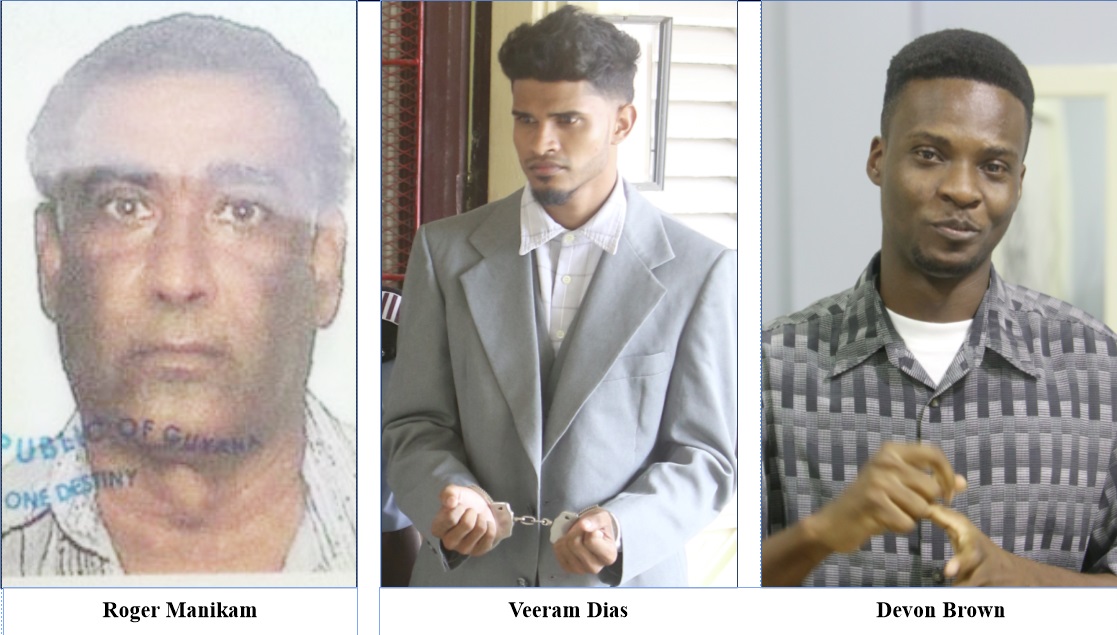Legal proceedings against two naturalised Canadian citizens who were charged with the 2016 murder of a Non Pariel pensioner were terminated after their co-accused accepted liability for the crime, an official of the Chambers of the Director of Public Prosecutions (DPP) said yesterday.
Some observers have expressed concern that Nalini Manikam who was 19 years old at the time of committal to the High Court for trial along with a 13 year old girl got off lightly and they said that this particular development exposes loopholes in Guyana’s legal system.
Stabroek News was unable to get clarity from the attorneys involved in the case but was told that when Nalini’s boyfriend, Veeram Lall Dias pleaded guilty, the case against the two girls came to an end.
The girls, Dias and Devon Brown were in 2017 committed to stand trial for the murder following a preliminary inquiry in the Magistrate’s Court. They were jointly charged with murdering Roger Manikam, 65, on April 3, 2016, at Non Pariel Railway Embankment, East Coast Demerara.
When Stabroek News made contact with the Chambers, an official said that the case against the girls were “nolle prosequi” (termination of the charges), based on the fact that Dias and Brown pleaded guilty.
This newspaper reported in yesterday’s edition that the girls were repatriated to Canada following negotiations. The information provided to this newspaper is that after arrangements between officials of the two countries, the girls, who are both naturalized Canadian citizens, departed these shores for Canada where the younger girl was placed in foster care. The elder of the two, Nalini Manikam, the daughter of the deceased pensioner, has been living with relatives and is in the process of putting measures in place to further her studies. It would appear that their departure to Canada was recent.
Sources close to the case said that following the completion of the trial against Dias and Brown, an agreement was reached between the state and Canadian officials and the girls were released and sent to Canada.
It was related that the two girls had lived in Canada with their mother and had obtained citizenship. After their mother died the pensioner returned to Guyana with the two girls. The sources informed that the Canadian authorities had played a vital role during the trial and ensured that the two girls were taken care of and reports on their welfare given. They also stood the expenses of getting them to their naturalized homeland.
A post-mortem examination had revealed that the pensioner died as a result of brain haemorrhaging due to blunt trauma to the head. He had been discovered near a drain, some five corners from his house, along the Coldingen Embankment Road with a wound to the back of his head.
Presenting the prosecution’s case against Dias and Brown in the High Court, state attorney Mandel Moore had said that Roger Manikam was lured into the kitchen of his 237 Section B Non Pariel house by Dias, Nalini’s reputed husband, who also lived at the address.
The court heard that there, Dias unleashed blows on the man, hitting him to the head with an axe. Although the man fell, he thereafter continued inflicting more blows.
The prosecutor said that sometime after, Dias called his friend Brown to the scene and they both placed Manikam’s body in Brown’s car and drove to the Coldingen Embankment Road, where they dumped the body.
Dias pleaded not guilty to the charge of murder but admitted instead to the lesser count of manslaughter, accepting that he had unlawfully killed Manikam and was in April of this year sentenced to 14 years in prison but this was later reduced to 12 years. Brown was sentenced to time served as an accessory after the fact.
A prominent attorney while contending that what has occurred is unjust, said that the DPP is given that power under the constitution. He said that the law described the process as discontinuation and not “nolle prosequi”.
He referred this newspaper to Article 187 of the constitution which speaks to the functions of the DPP. It states that the DPP shall have the power “to discontinue at any stage before judgment is delivered any such criminal proceedings instituted or undertaken by him or any other person or authority”.
“Isn’t that beautiful? That is nonsense!”, the attorney said in reaction to the termination of the charge against the girls.






